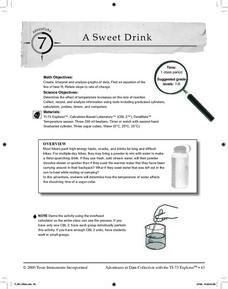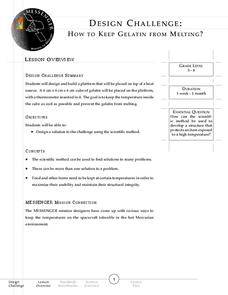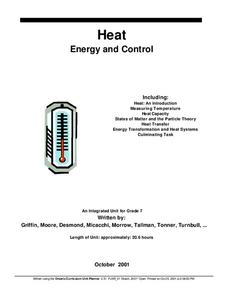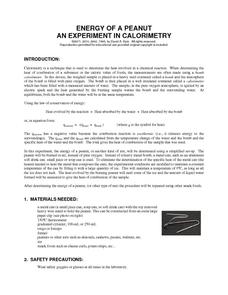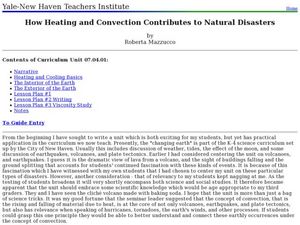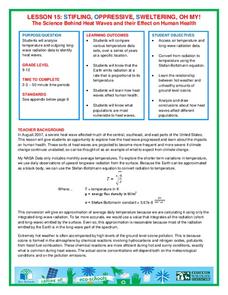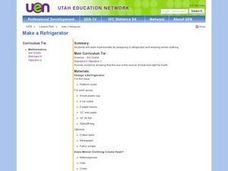Curated OER
Heat and electrical resistance (Middle, Science)
Pupils work in teams to create electrical resistance when studying heat and thermal energy.
Curated OER
Sun and Temperatures
Students consider the relationship of temperature to environmental conditions and then apply their knowledge to a practical event. The task assesses students' knowledge and application of that knowledge to an additional situation.
Curated OER
A Sweet Drink
Students investigate reaction rates. In this seventh or eighth grade mathematics lesson, students collect, record, and analyze data regarding how the temperature of water affects the dissolving time of a sugar cube. Studetns determin...
Messenger Education
Design Challenge: How to Keep Gelatin from Melting
The inside of the spacecraft Messenger, which explores Mercury, will experience temperatures from 32 to 91 degrees Fahrenheit. In the final installment of a series of four space-related activities, groups spend time discussing and...
Kenan Fellows
How Much Energy Is That Anyway?
The fifth lesson in the six part series introduces units of energy including calories, Calories, and joules. Scholars determine the energy released when eating a snack and during activity.
Curated OER
11 - The Heat Is On
Pupils observe physical change of melting by observing substance in original state, melting substance, allowing substance to return to original temperature, determining if substance retained its original properties, and recording results.
Curated OER
Energy and Control
Seventh graders construct a lunch box that maintains functional temperature zones and does not allow heat transfer between the zones. They examine the transfer of heat, the capacity of certain materials to hold heat, and how the...
Curated OER
Energy Changes, Rates of Reactions, Nuclear Chemistry
In this energy changes, rates of reactions and nuclear chemistry worksheet, high schoolers solve 14 problems to review concepts about endothermic and exothermic reactions, heat of combustion, heat of reactions, enthalpy, kinetic and...
Chymist
Energy of a Peanut
Are you nuts? An engaging experiment burns nuts to find their kilocalories. Young chemists analyze at least two different types of nuts with their experimental results versus what is on the package. The resource offers a great lab for...
Curated OER
Heating the Earth
Middle schoolers explore how the angle of sunlight affects the Earth's temperature and seasons and then apply this understanding to their local situation.
Curated OER
How Heating and Convection Contributes to Natural Disasters
Students study the basics of heating and cooling and how it pertains to the earth. In this global lesson students read the Magic Tree House book then create a chart of their findings.
Curated OER
Temperature Scales
Eighth graders explore how to read a thermometer. They convert temperature between Celsius, Fahrenheit and Kelvin. Students explain that Celsius is used in the Scientific community and Fahrenheit is used basically only in the United...
National Wildlife Federation
Stifling, Oppressive, Sweltering, Oh My!
Looking for a hot date? Pick any day in August, statistically the hottest month in the United States. The 15th lesson in the series of 21 instructs pupils to investigate the August 2007 heat wave through NASA data, daily temperature...
American Chemical Society
Evaporation
This is one in several lessons that explore the relationship between temperature and phase changes of water. After some discussion, elementary physical scientists place wet paper toweling on a hot and a room-temperature water bag and...
Virginia Department of Education
Charles’ Law
Searching for a relatively interesting way to demonstrate Charles' Law? Here is a instructional activity in which pupils heat air inside a flask and then cool the flask to quickly cool the air. They make observations about what occurs...
American Chemical Society
Preparation and Combustion of Biodiesel
The United States is the world's largest producer of biofuel. During an in-class investigation, young scientists produce their own biodiesel. They burn a sample of it to determine the heat of combustion. Then they discuss the results...
American Chemical Society
Condensation
It's time to break the ice! If you are doing all of the lessons in the unit, children have already seen that increasing heat increases the rate of evaporation, but is the opposite true? Does decreasing temperature cause more condensation...
Curated OER
The Role of the Atmosphere and Greenhouse Effect in Determining the Surface Temperature of the Earth
Students complete research and solve problems that show the factors that determine the temperature of the earth's surface including the effect of greenhouse gases. They look at the relationships between solar energy, atmosphere, and how...
Curated OER
Make a Refrigerator
Third graders explore the concept of heat transfer as experienced in wearing winter clothing and analyzing the refrigerator.
Curated OER
Fahrenheit Follies
Second graders analyze the effects of sunlight on a glass of water by using the thermometer to measure its temperature. They predict and measure the difference between water outside in the sun and shade and inside. They role-play a game...
Curated OER
TE Activity: Hot or Not
Students examine how the human immune system responds to germs and explain what a fever is. They design a thermometer in order to further explore temperature before completing a temperature conversion worksheet. They detail the work of...
Science Geek
Bulk Properties of Water
Learn the ins and outs of the properties of water through an engaging slide show. The lesson presents different facts about water including phase change, heat of fusion, heat of vaporization, and specific heat among others.
It's About Time
What Drives the Plates?
It's getting hot in here! Lead your emerging geoscientists on a thrilling journey as they calculate liquid densities to determine forces that stimulate thermal plates from within the earth's crust. They explore effects of temperature on...
NASA
States of Matter
Water, one of the basic needs of humans, is found in all three states of matter on Earth; no other planet—that we know of—possesses this quality. Here is a unit that allows learners to explore through experimentation what it takes to...




